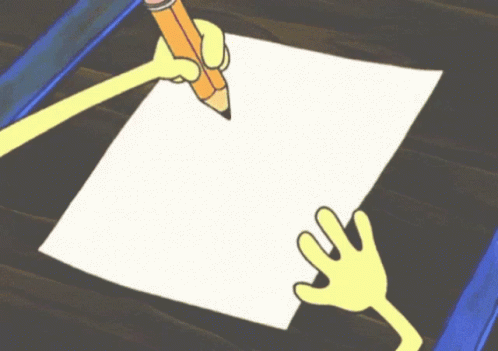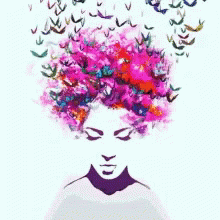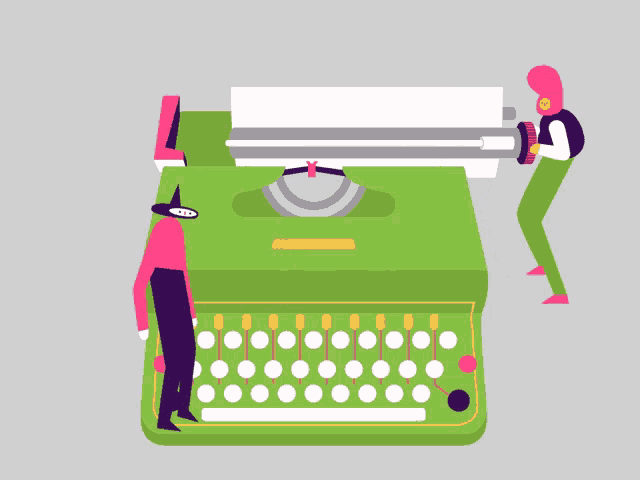"An illustrator captures the essence of a story or concept, while a concept artist brings that story or concept to life, shaping the visual direction."
Syd Mead
As someone embarking on a journey into the animation industry, you might find yourself standing at the crossroads of a perplexing decision. The quandary? The illustrator vs concept artist debate. Understanding the distinction between these two professions and their unique contributions to the world of art can be a challenge.
Both roles present an appealing array of skills, expertise, and deliverables that can significantly impact the direction and success of your animation project. To aid your decision-making process, this comprehensive blog post will shine a light on the critical differences between an illustrator and a concept artist.
By understanding the nuances of each role, you'll be better equipped to make an informed decision that aligns with your project's requirements.
Cover GIF by Sentipensantes via GIPHY
Distinguishing Between an Illustrator and a Concept Artist: Defining the Roles
Before we plunge into the depths of the "illustrator vs concept artist" debate, it's vital to grasp what each role entails in detail. The specifics of their job descriptions will offer significant insights into how they might contribute to your project.
Illustrator: The Craftsmen of Visual Narratives

GIF by Hashtagmircales via Tenor
Illustrators are masters of transforming abstract ideas into concrete visuals that tell compelling stories. Their creations populate a diverse range of media, including books, magazines, websites, and, crucially for our discussion, animation. Illustrators specialize in translating complex narratives into visually appealing and easily digestible forms.
Their work often simplifies intricate information, providing audiences with an engaging and entertaining learning experience. Whether it's through a children's book or a sophisticated animation project, illustrators skillfully weave together visuals and narratives, captivating their audience's attention and making lasting impressions.
Concept Artists: The Visionaries of Preliminary Design

Contrarily, concept artists are the imaginative brains that breathe life into unformed ideas. They specialize in creating concept art, which serves as the visual blueprint for projects in their initial stages. Their task is to provide a clear vision of what the final product might look like, based on abstract, often scant information.
They design characters, environments, props, and other visual elements, collaborating closely with directors and producers in the animation industry. These professionals shape and communicate ideas through their art, helping to define the look and feel of the animation project from its inception.
The Key Differences: Illustrator vs Concept Artist
Having established a basic understanding of these roles, let's navigate deeper into the illustrator vs concept artist comparison by exploring their key differences:
Artistic Focus: Narration vs Design

GIF by Caroline Attia Studio via GIPHY
The fundamental difference between an illustrator and a concept artist lies in their artistic focus. While both are visual artists, they serve different purposes in a project. An illustrator's work is often narrative-driven, crafted to connect with specific audiences on an emotional level. They utilize their artistic skills to tell stories and invoke specific feelings or responses from the viewer.
In contrast, a concept artist's work is primarily design-focused. They aim to visually communicate ideas and concepts, working extensively on the preliminary design phases of a project. Their creations form the foundational visual elements that guide the look and feel of the entire project.
Creative Process: Interpretation vs Ideation

The creative process also significantly varies between these two roles. Illustrators typically receive a well-defined brief, which they interpret and translate into compelling visual narratives. Their work process requires a deep understanding of storytelling techniques, audience preferences, and artistic styles.
Conversely, concept artists often start with abstract ideas or loose guidelines. They shape these ideas into tangible designs, using their creativity and innovation to create a comprehensive visual guide. Their work requires a blend of artistic talent and design thinking, ensuring the concepts they create align with the project's overarching theme and goals.
Choosing Between an Illustrator and a Concept Artist: Aligning With Your Project's Needs
Your choice between an illustrator and a concept artist will largely hinge on your project's specific needs:
For Visual Storytelling: Illustrator

GIF by lobsterstudio via Tenor
If your project leans heavily on visual storytelling tailored for a specific audience, an illustrator could be your best bet. Their expertise in creating compelling visuals and weaving engaging narratives can bring your stories to life, resonating with your audience on a profound level.
For Early-Stage Visualization: Concept Artist
However, if you're in the early brainstorming phase of your animation project and require assistance in visualizing and designing characters, environments, or other elements, a concept artist would be more suitable. Their skills in creating comprehensive and cohesive design plans can provide clear direction for your project's visual development.
Navigating the Illustrator vs Concept Artist Decision for Your Animation Projects

GIF by Emmelinedraws via GIPHY
In the grand landscape of the illustrator vs concept artist discussion, it's evident that both roles bring unique value and perspectives to the table. The decision ultimately rests on your animation project's specific needs, goals, and stage of development.
Remember, whether you choose an illustrator or a concept artist, the success of your project hinges on clear communication and a shared vision. Both professionals need to fully understand your project's requirements to create visuals that align with your vision and resonate with your audience.
To help you navigate these complexities, our Animation Business Accelerator Program provides comprehensive guidance on starting and growing your animation business. The program covers everything from hiring the right talent to marketing your services effectively.
And for those considering establishing an animation studio, don't miss our blog post on "How to Start an Animation Studio". Remember, animation isn't just about creating moving images; it's about creating a profitable business and thriving in the animation industry!



